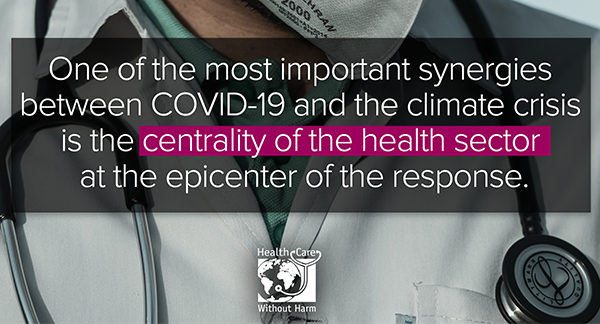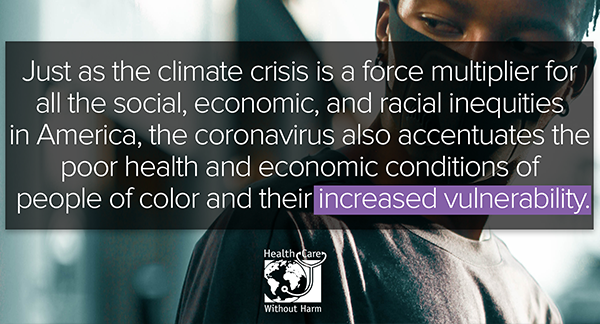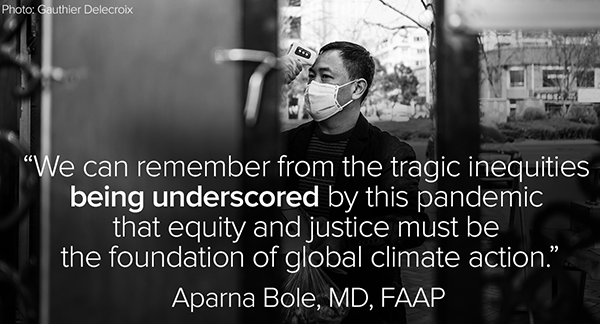Connections between coronavirus pandemic and the climate crisis

The COVID-19 pandemic has exposed many of the vulnerabilities inherent within our current health system, supply chain, and communities. It is increasingly apparent that within each of these realms, there has been a real-time response of adaptation and innovation that is not only inspiring to witness, but provides insights into lessons learned and the path forward.
The value of these insights and innovations is by no means limited to this moment or this virus. Equity and health are the foundational elements upon which we can build resilience into each of these systems and communities. We must apply these lessons, and the innovations of policy and practice that flow from them, as we collectively prepare for the continuing stressors of climate change.
In this space, Health Care Without Harm seeks to create a library to share, learn, and inspire each other as we draw from the incredible reservoir that is our network.
Articles
“Systemic Sustainability,” Business Officer Magazine
Gary Cohen, Health Care Without Harm founder, discusses the health sector's sustainability leadership and the importance of centering their work around building community resilience beyond COVID-19.
“Green hospitals may be better prepared to deal with COVID-19,” The Boston Globe
Learn how Boston Medical Center’s leadership and practical approach to climate solutions and resilience prepared them for managing the coronavirus pandemic, presenting a model to replicate at safety-net hospitals around the country.
"The toxic chemicals in our homes could increase COVID-19 threat," The Guardian
This article explores the impact on our immune systems due to potentially harmful chemicals in everyday products – calling attention to the need for more research and stricter enforcement to limit exposures to toxic chemicals in our homes.
“U.N. secretary-general says climate change devastation will be ‘many times greater’ than coronavirus pandemic,” Newsweek
During a recent speech, António Guterres noted the global community's "adaptation" and financial "resilience" in overcoming the pandemic should be continued in the fight against climate change
“Air pollution may be ‘key contributor’ to COVID-19 deaths,” The Guardian
An analysis of coronavirus deaths in four European countries shows 78% occurred in the most polluted regions.

“New research links air pollution to higher coronavirus death rates,” The New York Times
A study from Harvard University T.H. Chan School of Public Health is “part of a small but growing body of research that offers a view into how a lifetime of breathing dirtier air can make people more susceptible to the coronavirus.”
“What the coronavirus curve teaches us about climate change,” Politico
As many try to “flatten the curve” of the coronavirus pandemic, the same public understanding is needed to take early action to drive a steep and rapid reduction in carbon emissions. As we continue to see exponential increases in climate impacts from financial losses to extreme heat and wildfires, we must learn from our failure to respond quickly to COVID-19 and not make the same mistake.
“Dumped milk, smashed eggs, plowed vegetables: Food waste of the pandemic,” The New York Times
The coronavirus pandemic is highlighting the complexity of our food supply chain and its inability to adapt. Increasing numbers of people are facing food insecurity while 5% of the country’s milk supplies are being dumped and crops are being plowed back into the soil.
“As supermarkets feel hazardous and sparse, small farms deliver,” The New York Times
Local and regionalized food supply chains are proving more resilient – able to adapt to new market pathways and customer needs in the face of the pandemic’s economic disruption.
Blogs and opinion pieces
“Community resilience after the coronavirus pandemic,” The Hill
An opinion piece by Gary Cohen, Health Care Without Harm founder, examines the centrality of the health care sector in a public health crisis, using lessons learned from the pandemic to shape our response to future threats.
“The deadly link between COVID-19 and air pollution,” an opinion piece by Josh Karliner, Health Care Without Harm international director for program and strategy; Jane Burston, Clean Air Fund executive director; and Arvind Kumar, Lung Care Foundation of India founder and managing trustee, The World Economic Forum
After looking at the health and economic impacts the COVID-19 pandemic will have globally, especially the disproportionate impact on the poor and most vulnerable, this piece calls for world leaders to look toward economic stimulus investments to “fast forward to a renewable energy economy. A transition to clean, renewable energy and transport will seriously reduce air pollution, greenhouse gas emissions and the impact of future pandemics.”

“The government should bail out families, not the fossil fuel industry,” a blog by Gary Cohen, Health Care Without Harm founder
Cohen shares, “the coronavirus pandemic may yet serve as an example of how we leveraged a crisis to scale up our own social safety net and build community resilience.” He calls for the government to prioritize support for working-class families instead of committing taxpayer funding to toxic industries like oil and gas that harm the public and the planet.
“Coronavirus and the climate crisis: Common causes and shared solutions,” an essay by Josh Karliner, Health Care Without Harm international director for program and strategy
Karliner explores a series of climate change and coronavirus connections including common causes and shared solutions; calls for governments around the world to invest in public health, health care access for all, and community resilience to confront global health emergencies; and argues for fundamental changes in the world economy to ensure a future that reduces the odds of future pandemics and climate change’s impacts through the embrace of sustainable energy, agriculture and transportation
“5 lessons from coronavirus that will help us tackle climate change,” Time Magazine
Christiana Figueres, former U.N. secretary of the U.N. framework convention on climate change, discusses the similarities and differences between climate change and coronavirus in hopes to better position us towards less expensive prevention-based solutions for the future. If our next decisions to restart the economy take into account that global challenges have no borders and we are only as safe as our vulnerable people, “political and financial leaders now have an unprecedented historical opportunity to accelerate the energy transition putting us onto a safe path toward.”
“The coronavirus is a preview of our climate-change future,” an essay by David Wallace-Wells, The Intelligencer, New York Magazine
"COVID-19 is not a climate-change pandemic – as far as we know, nothing about the emergence or spread of the coronavirus bears the recognizable imprint of global warming. But if the disease and our utter inability to respond to it terrifies you about our future staring down climate change, it should, not just as a ‘fire drill’ for climate change generally but as a test run for all the diseases that will be unleashed in the decades ahead by warming."
“Lessons from the COVID-19 pandemic provide a blueprint for the climate emergency,” British Medical Journal
Dr. Renee Salas, a frontline emergency room physician and climate change researcher, shares three important lessons from the pandemic to apply to the climate crisis: health professionals must use their voices as trusted sources, prevention must be prioritized, and a rapid, coordinated global response is essential.

“Climate change: Lessons from the COVID-19 pandemic,” a blog by Dr. Aparna Bole, pediatrician and Health Care Without Harm board chair
One of the valuable lessons from the fight against COVID-19 has been how we can take collective action to respond to a crisis. The lessons of COVID-19 also show us our current social structures are unsustainable. We have an opportunity now to transform these patterns and instead work together to create communities that are inclusive, vibrant, and healthy.
"On the hospital front lines, conquering fear and finding hope," US News and World Report
Dr. Renee Salas, a frontline emergency room physician and climate change researcher shares, “we also can wrestle with philosophical questions and collectively reflect on injustices, especially those that have been further exposed by this crisis. We are all grieving the loss of the world as we knew it. Yet this also means we have a profound opportunity and responsibility to unite in shared hope as we envision a better world – one that is more loving, just and better prepared for the next emergency.”
Webinars
"Building community health and resilience beyond COVID-19," Health Care Without Harm
Health Care Without Harm founder Gary Cohen and experts from Emerald Cities Collaborative, Agri-Cultura, and Cleveland Clinic discuss the different dimensions of community resilience as well as health care’s essential role in creating solutions. Find out innovative approaches to keeping capital in the community, building infrastructure to support the community beyond a hospital’s walls, and creating a healthy environment for all – especially the most vulnerable in our communities.
“Coronavirus and the climate crisis: Mobilizing health for common solutions,” Health Care Without Harm and the Skoll Foundation
As part of the Virtual Skoll World Forum Week, more than 800 participants from 50 countries joined a webinar to learn how climate change and the coronavirus pandemic are deeply intertwined in both cause and effect and explore opportunities for collective action to confront these threats.
